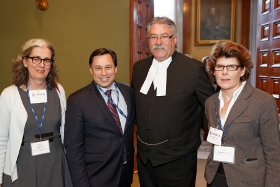OCUFA, as a member of the Ontario University and College Coalition, a coalition of student, staff and faculty organizations, is deeply concerned about the findings of a new report, released today by the Canadian Centre for Policy Alternatives, which projects that the average cost of university tuition and other compulsory fees in Ontario will reach nearly $10,000 per student, per year by 2016-17. The report also shows that Ontario is one of the least affordable provinces in which to study for low- and middle-income families.
The report, “Degrees of Uncertainty: Navigating the Changing Terrain of University Finance,” looks at how funding for universities has moved away from public sources towards a reliance on private funding through tuition fees. In Ontario, the government provides about 46 per cent of university operating funding, while students provide 41 per cent. This represents a significant change from 20 years ago, when government funding accounted for 66 per cent of university operating funding and tuition fees accounted for 25 per cent.
“Rather than shifting the cost of higher education onto students and their families, the provincial government must increase public investment in our universities and control tuition fees in order to ensure affordability,” says OCUFA President, Kate Lawson. “Investing in universities is good public policy; universities educate students, create jobs and economic growth, and help build a strong democratic society.”
The report also points out that provincial responses to declining affordability have been “muted.” Most provinces, including Ontario, have introduced complex and unpredictable financial aid measures such as the Ontario Tuition Grant instead of universal measures to address affordability concerns.
“Students have been sounding the alarm about how high fees are pricing them out of a university education in Ontario,” says Alastair Woods, Chairperson of the Canadian Federation of Students. “This report confirms that even when the Ontario Tuition Grant is taken into account, the Liberal government’s policy of year over year tuition fee increases has eroded the affordability of university education in Ontario.”
The Ontario University and College Coalition has long called on the provincial government to increase funding to reduce tuition fees; hire more faculty and provide adequate funds dedicated to support staff who ensure a successful academic career for students.
The Ontario University and College Coalition is a coalition of student, staff and faculty associations that aims to promote a high-quality and affordable system of post-secondary education in Ontario. The coalition is composed of the Canadian Federation of Students-Ontario, Canadian Union of Public Employees Ontario, Confederation of Ontario University Associations and Unions, Ontario Confederation of University Faculty Associations, Ontario Federation of Labour, Ontario Public Service Employees’ Union, Ontario Secondary School Teachers’ Federation, Public Service Alliance of Canada, UNIFOR and United Steelworkers.






